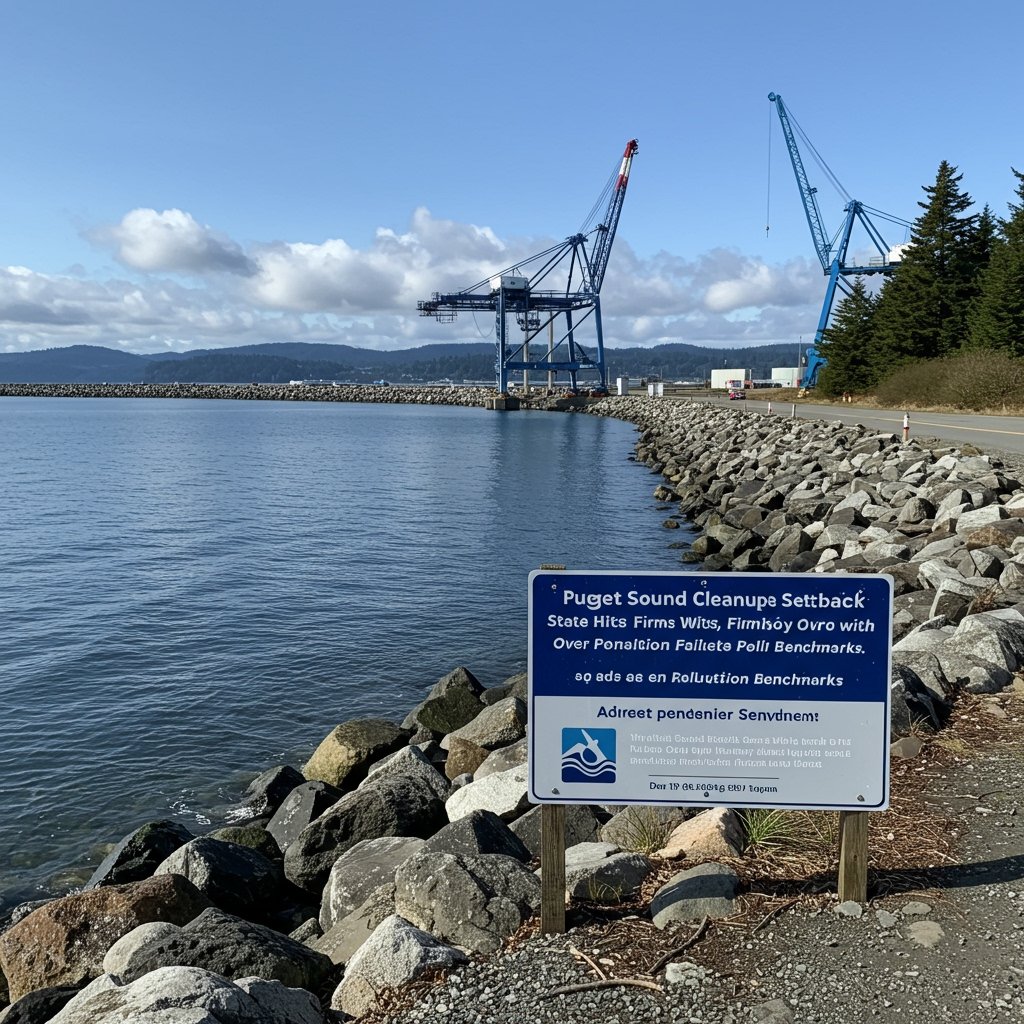State Imposes Penalties Following Discovery of Cleanup Violations Near Tacoma
The Washington Department of Ecology (WDOE) today announced significant enforcement actions against two companies responsible for remediation efforts at the long-troubled “Delta Industrial” site located near Tacoma. The state regulators cited Acme Corp. and Beta Inc., the firms tasked with overseeing the complex cleanup operation, for failing to meet critical pollution reduction benchmarks stipulated in a legally binding agreement.
Specifically, WDOE investigators determined that the companies missed key 2025 targets established for curbing the flow of mercury and PCB contamination emanating from the site and entering Puget Sound. These benchmarks were laid out in a 2020 consent decree, a formal agreement between the state and the responsible parties outlining the required steps and timeline for environmental remediation.
Sarah Chen, a spokesperson for the WDOE, confirmed the state’s decision to pursue substantial daily financial penalties against the firms until compliance is demonstrated. “Our priority is the health of Puget Sound and the communities that rely on it,” Chen stated. “The consent decree sets clear expectations and timelines. Missing these crucial benchmarks is unacceptable and requires a swift and decisive response from the state.”
The potential penalties could be significant, potentially reaching tens of thousands of dollars per day, according to WDOE officials. These daily accruals are designed to incentivize rapid action and bring the cleanup process back on schedule.
Legal Action and Required Response
As a direct result of the findings, Acme Corp. and Beta Inc. have been issued formal notices of violation by the WDOE. These notices legally document the specific instances of non-compliance with the terms of the 2020 consent decree.
The companies have been given a stringent 30-day deadline to respond to the violations. Their required response includes submitting an accelerated remediation plan. This plan must detail how they intend to immediately address the persistent levels of mercury and PCB contamination and outline accelerated strategies to meet the missed 2025 reduction targets, as well as ensuring future benchmarks are achieved.
“We expect a comprehensive and aggressive plan that demonstrates a clear commitment to correcting these failures and protecting the environment,” Chen added, emphasizing the urgency of the situation.
The Delta Industrial Site: A Lingering Environmental Challenge
The Delta Industrial site has a long history of industrial activity that resulted in significant legacy contamination, primarily with heavy metals like mercury and persistent organic pollutants such as PCBs (polychlorinated biphenyls). These substances are highly toxic, persist in the environment, and bioaccumulate in the food chain, posing serious risks to marine life, including salmon, orcas, and shellfish, as well as human health through consumption of contaminated seafood.
The cleanup of such complex industrial sites is notoriously challenging, often involving vast quantities of contaminated soil and sediment, intricate groundwater issues, and the need for long-term monitoring and containment strategies. The 2020 consent decree represented a roadmap for tackling these issues, setting specific milestones to measure progress towards reducing the site’s environmental footprint on Puget Sound.
The failure to meet the 2025 benchmarks suggests that the implemented remediation strategies have not been as effective or as rapid as anticipated in addressing the mercury and PCB pathways from the site into the delicate marine ecosystem of Puget Sound.
Environmental Advocates Voice Disappointment
The news of the cleanup violations and delayed progress drew criticism from environmental advocacy groups closely monitoring the situation.
Representatives from organizations like “Save the Sound” expressed disappointment over the findings. They highlighted the ecological costs associated with prolonged exposure of Puget Sound to contaminants like mercury and PCBs.
“Every delay in cleaning up sites like Delta Industrial means more pollution entering our waters, harming wildlife, and impacting the health of our sound,” stated a spokesperson for Save the Sound. “While we appreciate the WDOE’s enforcement action, it’s disheartening that these critical deadlines were missed. The health of Puget Sound depends on polluters being held accountable and adhering strictly to cleanup schedules.”
The advocates underscored the importance of not only imposing penalties but also ensuring that the mandated accelerated plan leads to tangible and timely reductions in contamination levels.
Looking Ahead: The Path to Compliance
The next 30 days will be crucial as Acme Corp. and Beta Inc. develop and submit their revised remediation plan. The WDOE will review this plan rigorously to ensure it contains credible and effective measures to accelerate cleanup progress.
Failure to submit an adequate plan, or subsequent failure to implement it effectively and demonstrate tangible progress towards meeting the missed benchmarks and future targets, could result in continued and escalating penalties, as well as potential further legal action from the state.
The situation at the Delta Industrial site remains a key focus for state regulators and environmental stakeholders, underscoring the ongoing challenges and critical importance of cleaning up historical contamination to protect the ecological health and economic vitality of Puget Sound.



















